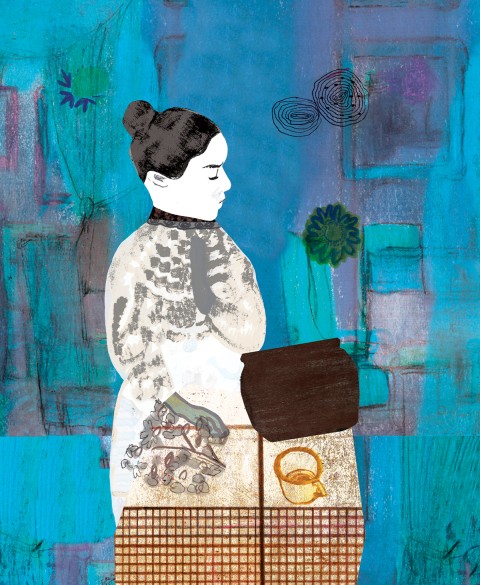
Illustration by Jorge González
I used to cook dinner at home every night. I have always been a fussy, multistep-recipe, sporadic sort of home cook. There is little I like better than leaning over a stockpot or peering into a dim oven to try to divine the mysteries of whatever is going on in there. The pandemic took this inclination and made it a daily habit. What else was there to do?
Cooking was a way to make the time pass, to put myself to work in a way I otherwise didn’t really have the opportunity for. If you’re reading in these lines the pandemic experience of a childless, email-class worker, you’re right to—my experience of the pandemic was one of isolation and quiet, not of overwhelm and new responsibilities.
Read our latest issue or browse back issues.
Cooking was a way to make things happen, to start the night with a pile of raw meat and vegetables and seasoning, purchased in a furtive biweekly masked-up trip to the grocery store, and finish it with a full belly and neatly packed Tupperware for the next day’s lunch. I continued working from home for the next four years, and for the next four years it felt natural and good to shut my laptop and immediately start peeling and chopping. It made me—the more abstracted, messier, more lackadaisical partner—feel accomplished, like I was contributing something to the running of the household.
There’s a Grace Paley poem, “The Poet’s Occasional Alternative,” that seems to sum this all up: “because of unreportable / sadnesses I decided to / settle this morning for a re- / sponsive eatership.” Sometimes the emails and the writing drafts are both bad, and a big, comforting meal is the one thing you think you can do right, in the face of it all, the one big tick mark you can put in your to-do list.
And then, a few months ago, I started a job that took me into an office nearly every day. The emails were still often bad, and the drafts of new writing somewhat fewer and farther between, but in addition I would get home an hour later than I was used to—with barely enough energy to throw some frozen dumplings in a pan, the sort of short cut I had avoided before.
At around the same time, you may remember, the news got significantly worse, every New York Times notification unleashing one more little bubble of anxiety to join the rest of them. Cooking became not only something that was harder, that felt like it took up more of my brain and effort and everything, but also something that mattered less in the grand scheme of things. What on earth was I doing cooking, tending to my stovetop, instead of working to put out the big fire raging in the world outside my kitchen?
So much of my life and work these days feel like a distraction. Why am I letting a presidential administration so plainly bent on distracting me accomplish its goals? On the other hand, how can I try to live a normal life when the slow slide into fascism is gaining speed every day? How can I take anything seriously that does not alleviate someone’s suffering? But here I am, at 6 p.m. every day, staring disconsolately into my refrigerator, trapped by the recurrence of my own hunger, by the needs of my all-too-human body.
It will not surprise you to learn that it is books—the meditations and musings of other people who have gone before me—that are helping me resolve this unease. Kathleen Norris’s The Quotidian Mysteries is about women’s work, about the dailiness of things like laundry and making dinner. It is also a book about time and how it changes us, how the little things we do day by day transform us in the way we transform them, how the dailiness of maintenance work keeps us in good relationship with God and each other. Norris reminds me that the work we do for care is never wasted, that God is a God of small details and minutia, and that all this can be holy, too.
Rebecca May Johnson’s Small Fires uses the tools of the literary critic to deconstruct and reconstruct the home cook’s dog-eared recipe, charting the way that she is, herself, changed through the repetitions—she calls them “performances”—of a recipe for a red, splattering tomato sauce. Her book itself is an attempt at “researching the relationship between the body and language, between self and other,” to take her own hunger and use it as a tool to understand the world around her. Cooking the tomato sauce teaches her how to meet the hunger of her friends and neighbors. It reminds her that her hands are always in relation to her ingredients, that her slightest intervention will have an effect on the finished meal and how it arrives on taste buds. Johnson teaches me that the work of the kitchen is the work of the world.
The work I do in front of the stove, the daily care I take with meals—this isn’t just about sustenance, or leftovers, or being healthy. Even—especially—on the days when it feels tedious and exhausting, cooking a meal for my husband and me puts me in relationship to him and to the world. It is an expression of my morals and concerns, reminding me that the smallest of my actions is performed in a web of mutuality and care.
This realization doesn’t necessarily give me more energy at the end of the day, when all I want to do is collapse into an evening-long doomscroll. But it does remind me that even these little daily things are all a part of making me ready for everything that is to come.







